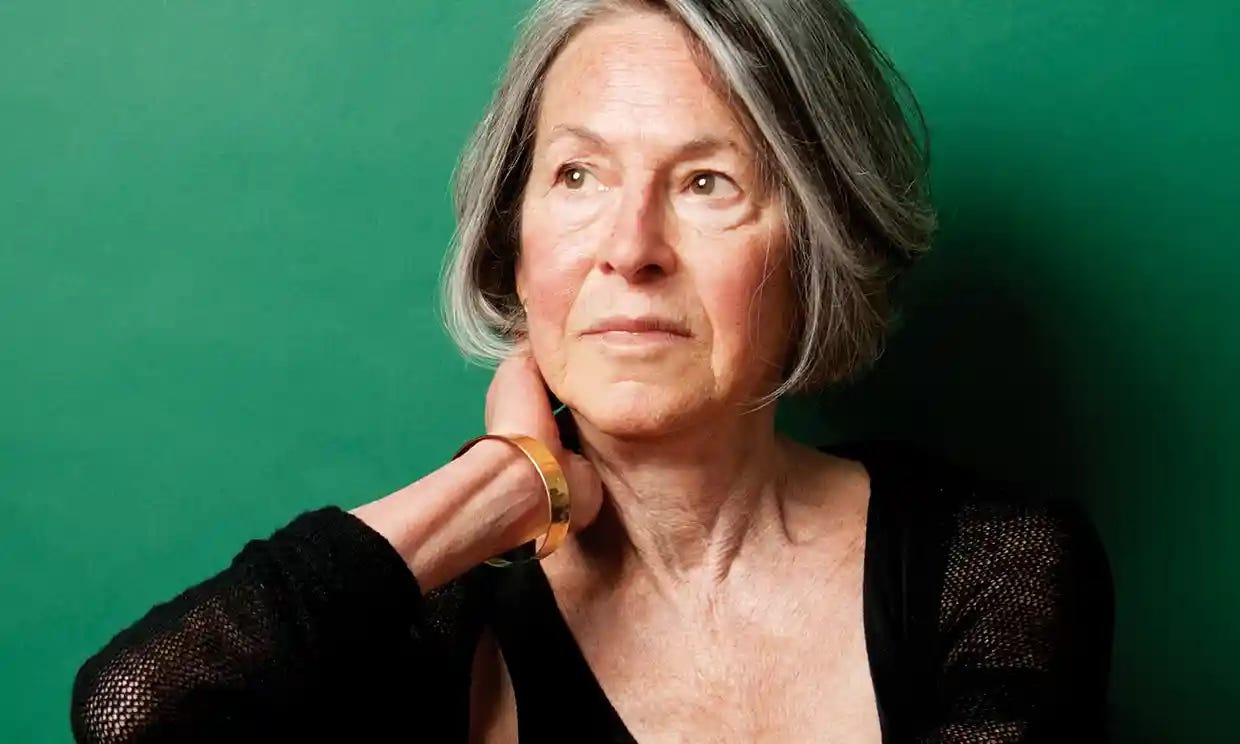Most lovers of poetry and literature by now know that Louise Glück died yesterday. I get personally sad about such things and have no problem admitting that I might cry over the death of someone I don’t know (example, David Bowie).
Glück is a hugely important poet to me. I had the pleasure of meeting her, hearing her read and spending a small bit of time with her, and it was a great as you would expect. She was years and years away from winning the Nobel Prize. Meeting her in person, she was a lot like her poetry—mysterious, the type of person who really thinks about something you say or ask and thus there were long pauses in terms of words floating in the air, and her reading (which I can still visualize and hear) packed the giant room on the University of Cincinnati campus. Hundreds and hundreds of people. For a poetry reading. (I once read to an audience of five, two of whom were cats.)
Glück, like me, had a deep love of classical literature and mythology, so that allowed me to quickly connect with her work. If you love Homer’s Odyssey, read Glück’s Meadowlands and you’ll feel exactly what I mean. It would be cliché to say that Louise Glück wrote “dark” poetry, just as it would be to label her “confessional.” Few descriptions can pin down her magic (hence the Nobel Prize), but I would say her poetry offers the “beautifully unsettling” or “uncomfortably gorgeous.” Don Bogen, my mentor in my doctoral program and quoted in her New York Times obituary, says, “She is as at heart the poet of a fallen world.” As always, Don is right.
What does that mean? I would go for very long stretches without reading Louise Glück. I would see her books on the shelf, books that I love, and leave them there. Why? Louise Glück has a way of inviting you into poems that are, let’s say, places. Once there, she would say something about herself, or others, or just human nature that were difficult (such is life in the fallen world), but she would be conveying truth. It’s difficult to read such things and admit, this could be me, this has been me, or even this is me right now. I love this about her work, the silent danger or threat that might be lurking, with the realization coming long after the reading of the poem itself. She wrote about quiet, often unseen pain and conflict. She wrote about how seemingly normal people can treat each other in the world. I could have read Louise Glück every day, but also understood I’d have to pay Charon for the ride.
I usually post poems on Sunday, but I’ll do so today. One of my favorite Louise Glück poems is an oldie called “The Triumph of Achilles.” (My senior seminar as an undergraduate was on Homer, so the work means a lot to me.) I’ve heard this poem interpreted in many ways, but deep down, I feel like I know this poem and what she’s saying. Because of that, it’s the most terrifying piece of writing about human friendship that I’ve ever read, and that’s okay.
Wow, how lucky we are to have had Louise Glück in the world and to have her work, still here, able to be held in our hands.
The Triumph of Achilles
by Louise Glück
In the story of Patroclus
no one survives, not even Achilles
who was nearly a god.
Patroclus resembled him; they wore
the same armor.
Always in these friendships
one serves the other, one is less than the other:
the hierarchy
is always apparant, though the legends
cannot be trusted—
their source is the survivor,
the one who has been abandoned.
What were the Greek ships on fire
compared to this loss?
In his tent, Achilles
grieved with his whole being
and the gods saw
he was a man already dead, a victim
of the part that loved,
the part that was mortal.




A beautiful, personal tribute. This is my favorite eulogy/tribute to Louise Glück that I've read.